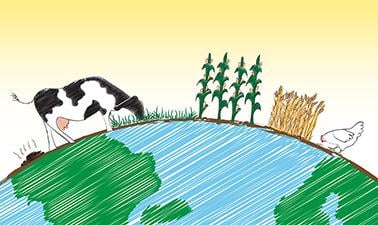- Level Foundation
- Ratings
- Duration 35 hours
- Course by Wageningen University & Research
- Total students 5,258 enrolled
-
Offered by

About
Systems thinking and environmental sustainability: solve the Rubik 's cube
Have you ever considered how many aspects of food production affect the natural environment? Every aspect needs to be considered in attaining the future goal to produce enough food for the growing population while at the same time preserving our planet. It's as difficult as solving a Rubik's cube; changing one aspect may affect the environment in a major way.
Systems theory, or systems thinking, is a way of understanding and working with the complexity of sustainable food production systems, which requires training in different disciplines and an approach that can address this complexity. This environmental studies course enables participants to apply the principles of a systems approach to food production with a focus on environmental sustainability.
The MOOC Sustainable Food Security: The value of systems thinking is part of the XSeries programme Food Security and Sustainability, which learns you more about how we can feed the world with its growing population and wealth in a sustainable way. The other MOOCs in this XSeries are Sustainable Food Security: Crop Production and Sustainable Food Security: Food Access.
The professors at Wageningen University
The University of Wageningen offers an excellent combination of conducting research worldwide and educating in the area of 'healthy food and living environment'. For each course, professors from specific fields of expertise are eager to teach and share the University's mission: "Explore the potential of nature to improve the quality of life".
This is why you should sign up
Sign up as a student if you want to acquire knowledge about environmental sustainability and the way systems thinking helps in decision-making in the complexity of food production. After successful completion of both practice and graded assignments related to this course, you will:
- Understand the complexity and diversity of food production systems
- Understand the principles of system analysis and apply it to environmental issues in food production
- Understand evaluation methods for the environmental impact of food production systems in different contexts and levels (e.g. farm, regional and global) Be able to evaluate strong and weak points of different food production systems regarding environmental sustainability
- Be able to contribute to a discussion about environmental sustainability and food production and ask relevant questions
What you will learn
In this course you will learn about:
- The concept of environmental sustainability and identify the main issues associated with food production
- The basics of systems thinking and understand how the different aspects of a system influence one another and how a system itself is affected by its context
- The relevance of crop and livestock productivity for environmental sustainability
- The environmental indicators and how to measure the environmental impact of food production at farm, village or regional level
- Decision-making and life cycle assessment
- Helpful tools and their strong and weak points
We will analyze production systems at both ends of the spectrum: highly productive systems with relatively high inputs and emissions to the environment, and low productive systems with low input use and depletion of soil fertility. Crop-livestock interaction is a focal point.
Skills you learn
Syllabus
Module 1: Complexity of sustainable food production systems
Module 2: Introduction to systems thinking
Module 3: Productivity indicators of food production systems
Module 4: Environmental indicators of food production systems
Module 5: Trade-offs between sustainability indicators
Module 6: Integration module with two case studies
Auto Summary
Embark on an enlightening journey with "Sustainable Food Security: The Value of Systems Thinking," a foundational course within the Science & Engineering domain, designed to equip you with the knowledge to tackle the complexities of sustainable food production. Taught by esteemed professors from Wageningen University, renowned for their global research and education in healthy food and living environments, this course offers a unique opportunity to learn from experts committed to improving the quality of life through nature. This engaging course delves into systems thinking and its application to environmental sustainability in food production, acknowledging the intricate interplay of various factors akin to solving a Rubik's cube. By integrating principles of systems theory, you will gain a comprehensive understanding of how to produce sufficient food for a growing population while preserving our planet. As part of the edX XSeries program on Food Security and Sustainability, this course complements other critical topics such as Crop Production and Food Access, providing a holistic view of sustainable food security. Over a span of 35 hours, you will explore the diversity and complexity of food production systems, learn to apply system analysis to environmental issues, and evaluate the environmental impact of different food production methods. By the end of the course, you will be well-equipped to contribute to discussions on environmental sustainability, ask pertinent questions, and make informed decisions in the realm of food production. Designed for those passionate about environmental sustainability and eager to enhance their decision-making skills, this course is available through a professional subscription. Join us and become part of the solution for a sustainable future.

Gerrie van de Ven

I.J.M. de Boer

Carolien Kroeze

Eddie Bokkers

Martin van Ittersum


